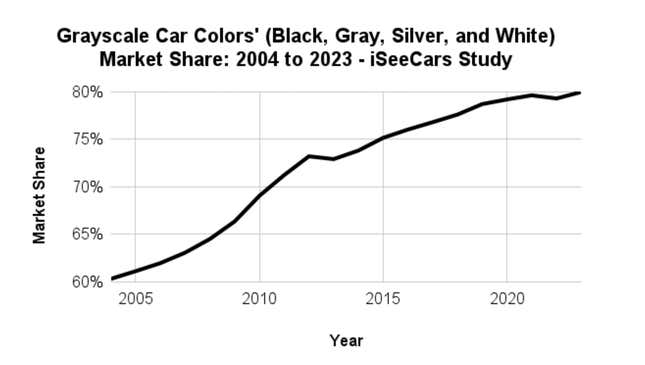Cars Have Gotten A Lot Less Colorful Over The Past 20 Years

No, your eyes aren’t deceiving you. Cars are getting less and less colorful, and we’ve now got the data to back that up. Cars that are in grayscale–black, white, silver and gray–have been increasing their color domination year over year, and it’s a damn shame because I am tired of these boring ass colors.
What’s the Best Paint Color For a Sports Car?
In 2004, grayscale cars made up 60.3 percent of the market. Make no mistake, that’s a ton, but it’s dwarfed by 2024’s new car color makeup of 80 percent, according to a new study from iSeeCars. That cuts the percentage of non-grayscale cars in half. This sucks, man. Apparently, gray has seen the biggest gain – raising 81.9 percent in 20 years – and silver was the biggest loser – dropping 52.2 percent.
You may think a reason for this huge drop in non-grayscale colors is that automakers aren’t offering any many fun colors anymore, but that’s not the case. iSeeCars says cars – on average – are offered with 6.7 non-grayscale colors. That’s only 0.4 fewer colors on average than in 2004. So, this drop is the buyers’ fault, not the automakers.
Graphic: iSeeCars
The most popular color for SUVs, trucks and sedans is still white – as it has been for the past 10ish years. Interestingly, gray is now nearly as popular as black, so I wouldn’t be surprised if they switch spots within a few years. Silver is certainly the least popular grayscale color, but it still commands between 8 and 9 percent of the market share depending on vehicle type.
This trend isn’t even escapable when you look at sports cars – vehicles that deserve interesting colors. Alas, gray is still the most popular color for sports cars. People have zero taste, man.

Graphic: iSeeCars
Here’s what iSeeCars Executive Analyst Karl Brauer thinks about the future of grayscale cars and why they’re so dominant today:
“Will grayscale shades drive out all other car colors over the next 20 years? A flattening of the curve in the past few years indicates a possible maximum market tolerance for these four colors,” said Brauer. “Whether driven by dealers ‘playing it safe’ by ordering only popular colors, or consumers wanting to ensure maximum interest when it’s time to sell or trade in their vehicle, grayscale colors play the dominant role in the car world.”
Interestingly, green is the only non-grayscale color to get any market gain since 2020. More obscure colors like gold, purple, brown and beige have lost 80 percent of their market share since 2004. Even normal colors like red and blue have given up some share.
Here’s how iSeeCars conducted their study:
iSeeCars analyzed the colors of over 20 million used cars from model years 2004 – 2023 sold from January 2023 to April 2024. The share of each color within each model year was calculated, as was the difference in share between model years 2004 and 2023.
“Colorful cars appear to be an endangered species,” said Karl Brauer, iSeeCars Executive Analyst. “Despite a diverse palette being offered by automakers, there are far fewer non-grayscale cars sold today. They’ve lost half their market share over the past 20 years, and they could become even rarer in another 20 years.”
Head on over to iSeeCars for a full breakdown of just how much ground non-grayscale car colors have lost over the past 20 years, and if you’re in the market for a new car, please buy one in an interesting color. I beg you.



